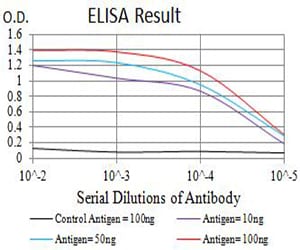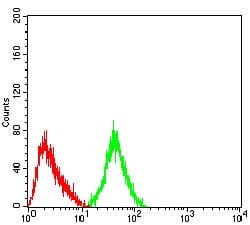



| WB | 咨询技术 | Human,Mouse,Rat |
| IF | 咨询技术 | Human,Mouse,Rat |
| IHC | 1/200 - 1/1000 | Human,Mouse,Rat |
| ICC | 1/200 - 1/1000 | Human,Mouse,Rat |
| FCM | 1/200 - 1/400 | Human,Mouse,Rat |
| Elisa | 1/10000 | Human,Mouse,Rat |
| Aliases | GLUR3; mGlu3; GPRC1C; MGLUR3 |
| Entrez GeneID | 2913 |
| clone | 7A5A6 |
| WB Predicted band size | 99kDa |
| Host/Isotype | Mouse IgG2a |
| Antibody Type | Primary antibody |
| Storage | Store at 4°C short term. Aliquot and store at -20°C long term. Avoid freeze/thaw cycles. |
| Species Reactivity | Human |
| Immunogen | Purified recombinant fragment of human GRM3 (AA: extra 433-576) expressed in E. Coli. |
| Formulation | Purified antibody in PBS with 0.05% sodium azide |
+ +
以下是3篇与GRM3(代谢型谷氨酸受体3)抗体相关的文献概述:
---
1. **文献名称**: "mGlu3 receptor regulates microglial cell reactivity in spinal cord injury"
**作者**: Besong G. et al. (2023)
**摘要**: 研究使用GRM3抗体标记小鼠脊髓损伤模型中的小胶质细胞,发现激活mGlu3受体可抑制神经炎症反应,提示其在神经修复中的潜在治疗价值。
---
2. **文献名称**: "GRM3 expression in glioma correlates with tumor progression and survival"
**作者**: Park J.H. et al. (2021)
**摘要**: 通过GRM3抗体免疫组化分析胶质瘤组织,发现高表达GRM3与肿瘤恶性程度及患者生存期缩短相关,表明其可作为预后标志物或治疗靶点。
---
3. **文献名称**: "Autoantibodies against mGlu3 receptor in schizophrenia patients"
**作者**: Ohnuma T. et al. (2019)
**摘要**: 利用GRM3抗体检测精神分裂症患者血清,发现部分患者存在抗mGlu3自身抗体,提示该抗体可能与谷氨酸能系统失调及疾病病理机制相关。
---
如需具体文献DOI或补充其他方向研究,可进一步说明需求。
The GRM3 antibody targets the metabotropic glutamate receptor 3 (mGluR3), a class C G protein-coupled receptor encoded by the GRM3 gene. Predominantly expressed in the central nervous system, GRM3 regulates synaptic transmission, plasticity, and neurodevelopment by modulating glutamate signaling, the primary excitatory neurotransmitter. Dysregulation of GRM3 is implicated in neurological and psychiatric disorders, including schizophrenia, anxiety, and autism spectrum disorders, as well as certain cancers.
GRM3 antibodies are essential tools for studying receptor localization, expression levels, and functional interactions in tissues or cell models. They are widely used in techniques like Western blotting, immunohistochemistry, and flow cytometry to investigate GRM3's role in disease mechanisms or therapeutic responses. Some studies explore GRM3 as a potential drug target, particularly for modulating glutamate pathways in neuropsychiatric conditions.
Antibody specificity varies depending on epitope recognition (e.g., extracellular vs. intracellular domains) and validation methods. Researchers must verify cross-reactivity, especially given structural similarities among mGluR subtypes. Commercial GRM3 antibodies are often raised against synthetic peptides or recombinant protein fragments, with applications spanning basic research, biomarker discovery, and preclinical drug development. Recent advances also highlight its involvement in tumor microenvironments, expanding its relevance to oncology studies.
×